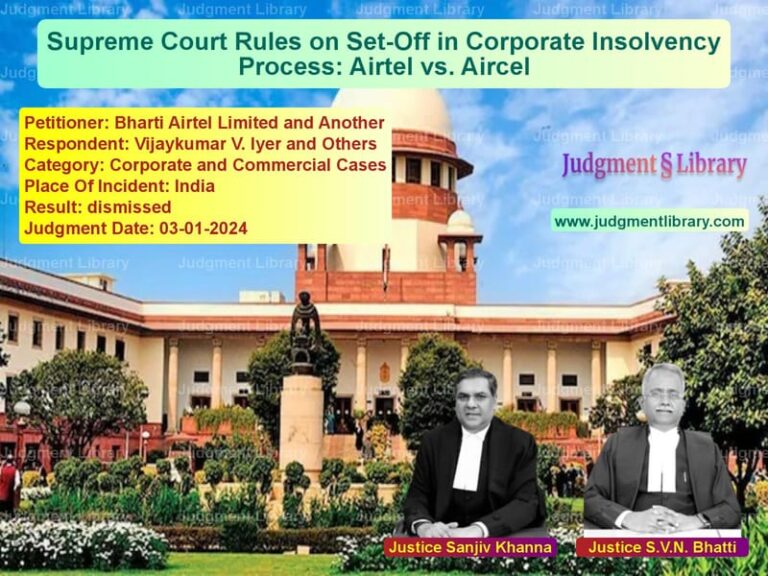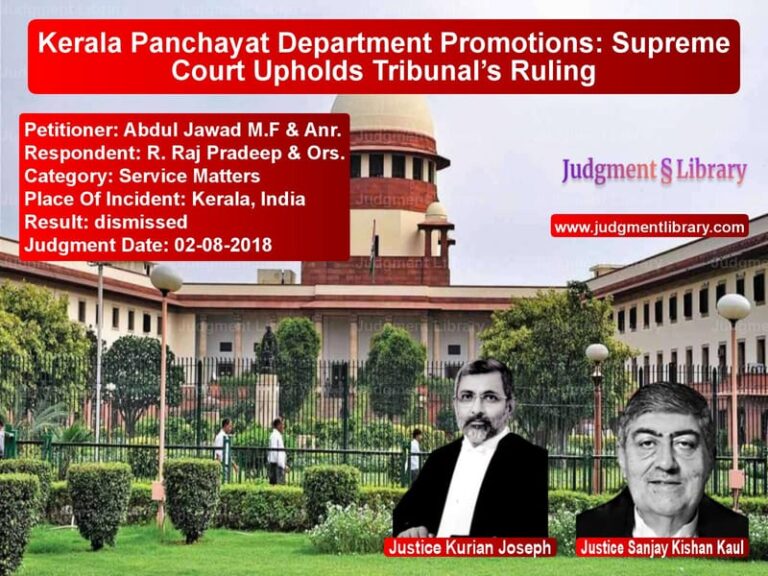Supreme Court Overturns Army Dismissal Due to Violation of Natural Justice
The case of Jaswant Singh vs. Union of India & Anr. is a landmark ruling that underscores the significance of procedural fairness and natural justice in military proceedings. The Supreme Court ruled in favor of the appellant, setting aside his dismissal from service and six months’ rigorous imprisonment, citing a clear violation of the right to legal representation.
The case originated from a Summary Court Martial (SCM) that found Jaswant Singh guilty of assaulting a superior officer and dismissed him from service. However, the appellant argued that his request for legal representation was wrongfully denied, a claim that ultimately led to his acquittal by the Supreme Court.
Background of the Case
Jaswant Singh was enrolled as a Sepoy in the Indian Army on January 1, 2003. He was tried under a Summary Court Martial (SCM) for two charges:
- Assaulting a superior officer.
- Using abusive language against a Subedar.
The SCM acquitted him of the second charge but convicted him on the first, leading to his dismissal and imprisonment. Dissatisfied with the decision, Singh approached the Armed Forces Tribunal (AFT), which upheld his dismissal. Subsequently, he challenged the ruling in the Supreme Court.
Key Legal Issues
- Whether denial of legal representation in a Summary Court Martial violated natural justice.
- Whether Rule 129 of the Army Rules, 1954, which allows an accused to seek legal assistance, was ignored.
- Whether the Summary Court Martial’s decision was sustainable despite the procedural irregularities.
Petitioner’s (Jaswant Singh’s) Arguments
Jaswant Singh’s counsel argued that his right to legal representation was wrongfully denied. His plea for a civilian advocate was rejected based on Regulation 479 of the Army Regulations, which allows legal representation only for offenses carrying a death penalty. His legal counsel contended:
“Rule 129 clearly states that an accused in a Summary Court Martial has the right to legal assistance. The denial of such representation violated fundamental principles of fairness.”
Singh also contended that, given the gravity of the charges, he was at a severe disadvantage while defending himself against the Commanding Officer.
Respondents’ (Union of India) Arguments
The Union of India defended the Summary Court Martial’s decision, stating:
“There was no prejudice caused to the accused, and the procedures followed in the trial were as per military regulations.”
The respondents also cited previous Supreme Court rulings that upheld military court judgments unless procedural lapses materially affected the outcome.
Supreme Court’s Observations
The Supreme Court, led by Justices Dr. Dhananjaya Y. Chandrachud and M.R. Shah, found that the denial of legal representation violated fundamental principles of justice. The Court noted:
“Rule 129 of the Army Rules, 1954, specifically allows an accused to have a legal adviser. The Commanding Officer was evidently in error in denying legal assistance on the ground that it was only permissible in offenses carrying a death penalty.”
The Court further ruled:
“In the face of Army Rule 129, there was no reason to deny him the benefit of legal representation which he desired at his own expense.”
Final Judgment
Considering the procedural lapses and violation of natural justice, the Supreme Court set aside the dismissal order and ruled:
“The appeal is allowed, and the decision of the Armed Forces Tribunal and the Summary Court Martial is set aside.”
However, the Court clarified that the Army was free to take further action in accordance with the law if necessary.
Significance of the Judgment
- Right to Fair Trial: The ruling emphasizes that military personnel are entitled to legal representation and fair procedures.
- Judicial Oversight: The case reinforces the role of civilian courts in ensuring due process in military trials.
- Procedural Safeguards: The judgment sets a precedent that Summary Court Martials must adhere strictly to procedural fairness.
Conclusion
The Supreme Court’s decision in this case highlights the importance of upholding natural justice in military proceedings. By overturning the dismissal of Jaswant Singh, the Court reaffirmed that procedural fairness cannot be overlooked, even in military discipline cases. The ruling ensures that future Summary Court Martials will be conducted with due regard to the legal rights of the accused.
Petitioner Name: Jaswant Singh.Respondent Name: Union of India & Anr..Judgment By: Justice Dhananjaya Y. Chandrachud, Justice M.R. Shah.Place Of Incident: India.Judgment Date: 10-12-2018.
Don’t miss out on the full details! Download the complete judgment in PDF format below and gain valuable insights instantly!
Download Judgment: Jaswant Singh vs Union of India & Anr Supreme Court of India Judgment Dated 10-12-2018.pdf
Direct Downlaod Judgment: Direct downlaod this Judgment
See all petitions in Disciplinary Proceedings
See all petitions in Public Sector Employees
See all petitions in Termination Cases
See all petitions in Judgment by Dhananjaya Y Chandrachud
See all petitions in Judgment by Mukeshkumar Rasikbhai Shah
See all petitions in allowed
See all petitions in Quashed
See all petitions in supreme court of India judgments December 2018
See all petitions in 2018 judgments
See all posts in Service Matters Category
See all allowed petitions in Service Matters Category
See all Dismissed petitions in Service Matters Category
See all partially allowed petitions in Service Matters Category







